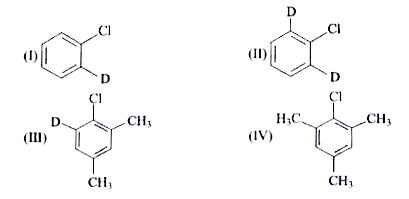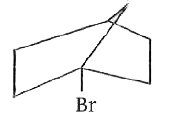Which of the following undergoes nucleophilic substitution exclusively by SN1 mechanism?
Benzyl chloride
Ethyl chloride
Chlorobenzene
Isopropyl chloride
The correct Answer is:A
To determine which of the given compounds undergoes nucleophilic substitution exclusively by the S1N mechanism, we need to analyze the stability of the carbocations formed during the reaction. The S1N mechanism involves two main steps: the formation of a carbocation and then the attack of the nucleophile.
1. Understanding the S1N Mechanism:
- The S1N mechanism involves two steps:
1. The leaving group departs, forming a carbocation.
2. A nucleophile attacks the carbocation to form the final product.
- The stability of the carbocation is crucial; more stable carbocations favor the S1N pathway.
2. Analyzing Each Compound:
- Benzyl Chloride (C6H5CH2Cl):
- When Cl leaves, it forms a benzyl carbocation (C6H5CH2+).
- This carbocation is stabilized by resonance with the benzene ring, making it highly stable.
- Therefore, benzyl chloride can undergo nucleophilic substitution via S1N mechanism.
- Isopropyl Chloride ((CH3)2CHCl):
- When Cl leaves, it forms a secondary carbocation ((CH3)2C+H).
- This carbocation is stable due to hyperconjugation but is less stable than the benzyl carbocation.
- It can undergo S1N, but it is not exclusive.
- Chlorobenzene (C6H5Cl):
- When Cl leaves, it forms a phenyl carbocation (C6H5+).
- This carbocation is very unstable due to lack of resonance stabilization.
- Chlorobenzene does not favor the S1N mechanism.
- Ethyl Chloride (C2H5Cl):
- When Cl leaves, it forms a primary carbocation (C2H5+).
- Primary carbocations are very unstable and do not favor S1N mechanism.
- Ethyl chloride does not undergo S1N.
3. Conclusion:
- Among the options analyzed, benzyl chloride is the only compound that undergoes nucleophilic substitution exclusively by the S1N mechanism due to the stability of the benzyl carbocation formed.
Final Answer:
Benzyl Chloride (C6H5CH2Cl) undergoes nucleophilic substitution exclusively by the S1N mechanism.
- The S1N mechanism involves two steps:
1. The leaving group departs, forming a carbocation.
2. A nucleophile attacks the carbocation to form the final product.
- The stability of the carbocation is crucial; more stable carbocations favor the S1N pathway.
- Benzyl Chloride (C6H5CH2Cl):
- When Cl leaves, it forms a benzyl carbocation (C6H5CH2+).
- This carbocation is stabilized by resonance with the benzene ring, making it highly stable.
- Therefore, benzyl chloride can undergo nucleophilic substitution via S1N mechanism.
- When Cl leaves, it forms a secondary carbocation ((CH3)2C+H).
- This carbocation is stable due to hyperconjugation but is less stable than the benzyl carbocation.
- It can undergo S1N, but it is not exclusive.
- When Cl leaves, it forms a phenyl carbocation (C6H5+).
- This carbocation is very unstable due to lack of resonance stabilization.
- Chlorobenzene does not favor the S1N mechanism.
- When Cl leaves, it forms a primary carbocation (C2H5+).
- Primary carbocations are very unstable and do not favor S1N mechanism.
- Ethyl chloride does not undergo S1N.
- Among the options analyzed, benzyl chloride is the only compound that undergoes nucleophilic substitution exclusively by the S1N mechanism due to the stability of the benzyl carbocation formed.
Benzyl Chloride (C6H5CH2Cl) undergoes nucleophilic substitution exclusively by the S1N mechanism.
Topper's Solved these Questions
- HALOALKANES AND HALOARENES BOOK - AAKASH INSTITUTE ENGLISHCHAPTER - HALOALKANES AND HALOARENES EXERCISE - ASSIGNMENT SECTION -D
15 Videos
- HALOALKANES AND HALOARENES BOOK - AAKASH INSTITUTE ENGLISHCHAPTER - HALOALKANES AND HALOARENES EXERCISE - ASSIGNMENT SECTION - B
25 Videos
- GENERAL PRINCIPLES AND PROCESSES OF ISOLATION OF ELEMENTSBOOK - AAKASH INSTITUTE ENGLISHCHAPTER - GENERAL PRINCIPLES AND PROCESSES OF ISOLATION OF ELEMENTSEXERCISE - Try Yourself
33 Videos
- HYDROCARBONSBOOK - AAKASH INSTITUTE ENGLISHCHAPTER - HYDROCARBONSEXERCISE - Assignment(Section - C) (Previous Years Questions)
60 Videos
Similar Questions
Knowledge Check
Which of the following will not undergo nucleophilic aromatic substitution ?
 AI, II and IIIBII and IVVCIII and IVDonly IV
AI, II and IIIBII and IVVCIII and IVDonly IVWhich one of the following undergoes nucleophilic aromatic substitution at the fastest rate ?
A B
B C
C D
D
Which of the following reactant will not favour nucleophilic substitution reaction ?
A BPh-BrCCH3CH3∣C∣CH3−CH2−BrDAll the above
BPh-BrCCH3CH3∣C∣CH3−CH2−BrDAll the above
Which one of the following compounds most readily undergoes substitution by SN2 mechanism?
View SolutionWhich of the following is least reactive towards nucleophilic substitution?
View SolutionWhich of the following compounds undergoes mucleophilic substitution reaction most easily?
View SolutionWhich of the following is least reactive in a nucleophilic substitution reaction?
View SolutionWhich ofthe following is most reactive towards nucleophilic substitution reaction ?
View Solution
